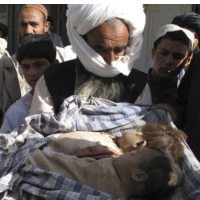Average U.S. Payment for Killing an Innocent Person in Afghanistan: $3,426
 Two children killed by U.S. airstrike in Helmand, Afghanistan May 29, 2011 (photo: Abdul Malik, Reuters/Corbis)
Two children killed by U.S. airstrike in Helmand, Afghanistan May 29, 2011 (photo: Abdul Malik, Reuters/Corbis)
Life is cheap, at least in Afghanistan. The U.S. government makes payments averaging only $3,426 to survivors of those killed as a result of American military action in that country.
An analysis by The Intercept showed that between 2011 and 2013, the U.S. military made 957 condolence payments totaling $2.7 million, $1.8 million of them for deaths with the maximum amount generally capped at $5,000. The largest single payment for a death—$15,000—came in 2011. Other payments are as low as $100.
Even when payments are made, they’re inconsistent. Sometimes a payment for property damage can exceed that for a death. In addition, many deaths go uncompensated because survivors live too far from a base where they can make a claim.
Payments are made under two systems. The first, the Foreign Claims Act, handles payments for issues such as traffic accidents caused by military personnel. That system does not include payments for injuries and death as a result of battle, however. In those circumstances “condolence payments” are authorized, but their amount and manner of payment vary wildly.
Last year, Sen. Patrick Leahy put a provision in the defense appropriations bill that would streamline the rules for condolence payments, making for quicker payments and improved record-keeping. The Defense Department has yet to implement these changes but says it’s “reviewing the processes related to ex-gratia payments to determine if there are areas where improvements can be made,” according to Cora Currier of The Intercept.
-Steve Straehley
To Learn More:
Our Condolences: How the U.S. Paid for Death and Damage in Afghanistan (by Cora Currier, The Intercept)
Hearts, Minds and Dollars: Condolence Payments in the Drone Strike Age (by Cora Currier, ProPublica)
How Much is the Life of a Dead Innocent Afghan Worth? (by Matt Bewig, AllGov)
The Forgotten Victims of the Bales Massacre (by David Wallechinsky and Noel Brinkerhoff, AllGov)
- Top Stories
- Unusual News
- Where is the Money Going?
- Controversies
- U.S. and the World
- Appointments and Resignations
- Latest News
- Trump Orders ICE and Border Patrol to Kill More Protestors
- Trump Renames National Football League National Trump League
- Trump to Stop Deportations If…
- Trump Denounces World Series
- What If China Invaded the United States?






Comments